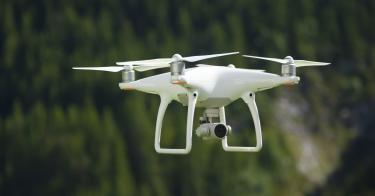Across today’s battlefields and even above American neighborhoods, small drones are rewriting the playbook of modern warfare and domestic security.
In Ukraine, swarms of low-cost drones have devastated armor and artillery. Here at home, Chinese-manufactured drones—particularly those from Chinese-owned Dà-Jiāng Innovations (DJI)—dominate our skies, law enforcement fleets, and even hobbyist shelves.
Beijing’s national security laws give the Chinese Communist Party (CCP) the ability to access any data collected by Chinese companies, including drone imagery. That means every flight over a power plant, a military facility, or a U.S. city risks feeding information back to an adversary.
DJI already controls a dominant share of the U.S. market. Recently, U.S. Customs withheld shipments under the Uyghur Forced Labor Prevention Act—showing how America’s reliance on Chinese drones collides with enforcing human rights and security standards. Each seizure underscores the friction of regulating supply chains when so many users still depend on these platforms.
Congress needs to respond decisively—and it has two bipartisan opportunities before it to do so.
The COUNTER Act, authored by Sens. Tom Cotton (R-AR) and Kirsten Gillibrand (D-NY), equips the Department of Defense and Department of Homeland Security with narrowly tailored authority to detect, track, and neutralize unauthorized drones around military installations and critical infrastructure.
>>> Staying the Course Means a War With China
COUNTER isn’t a blanket surveillance measure; it’s a defensive tool designed to stop hostile or suspicious drones before they can collect intelligence, disrupt operations, or cause harm. Reps. August Pfluger (R-TX11) and Chrissy Houlahan (D-PA06) are leading companion efforts in the House.
Complementing this effort, Sen. Rick Scott (R-FL) introduced Amendment SA 3154 to the FY26 NDAA (S.2296) to close a critical loophole. Last year’s NDAA already banned federal procurement and use of drones from Chinese firms like DJI and Autel. But adversary companies have a history of dodging restrictions by rebranding, spinning off subsidiaries, or shifting production overseas.
Scott’s amendment directs a national security review of unmanned aircraft systems, software, and communications equipment linked to any foreign adversary. If no determination is made within a year, the equipment is automatically added to the federal “covered list.” This ensures the CCP cannot sidestep U.S. law simply by creating shell companies or new labels, as it has done in other industries.
The risks of such evasion are not theoretical. In 2024–25, Anzu Robotics used licensed DJI technology to manufacture near-identical drones in Malaysia, allowing them to re-enter the U.S. market under a different name. House investigators allege the arrangement enables near-identical airframes to reach U.S. buyers through offshore manufacturing and a separate LLC.
DJI denies corporate affiliation, but the episode illustrates exactly why loopholes matter: without clear anti-evasion provisions, adversary technology will continue to seep into American markets. Scott’s amendment is designed to stop precisely this kind of work-around.
Unless Congress writes clear anti-evasion language and supply-chain disclosure requirements into law, the U.S. could remain exposed even while banning Chinese-branded drones.
Some opponents have voiced concern that counter-drone authorities risk expanding government surveillance. Protecting civil liberties is an essential principle—but in this case, the criticism misunderstands the legislation.
>>> Reestablish First Fleet and Advance AUKUS to Close Critical Gaps in America’s Pacific Defense
The COUNTER Act does not authorize the monitoring of Americans’ private communications. Its scope is limited to intercepting and disabling drone command signals around defined facilities. It contains oversight and reporting requirements to prevent misuse. In short, it balances the constitutional protections we hold dear with the practical necessity of defending soldiers, families, and communities from adversarial drones.
At a time when Congress is divided on so many issues, this bipartisan alignment delivers a powerful message: Countering Chinese technology dominance isn’t a partisan project—it’s a national imperative. Together, these provisions form a coherent strategy.
The stakes could not be higher. Our adversaries have already demonstrated how drones can change the character of war. Waiting until a catastrophic incident on U.S. soil would be a dangerous mistake. The combination of the COUNTER Act and Sen. Scott’s amendment provides a clear, bipartisan path: one that defends the homeland, safeguards civil liberties, and bolsters American industry.
Heritage Foundation research has warned for years that foreign-made drones are a direct threat, that DHS has been slow to respond, and that the U.S. military lacks the legal and technological framework to counter this challenge. These two measures close these gaps and deserve serious attention and swift action—not for partisan advantage, but for our national security.
Given the pace of technological change, delay only increases risk; Congress must act swiftly to align U.S. law with the urgent realities of drone warfare and supply chain security.
America shouldn’t depend on Beijing for the eyes in our skies. We can’t leave our bases, critical infrastructure, or city streets exposed to drones we know are compromised. Passing these bipartisan measures—while ensuring strong anti-evasion provisions—will send a clear message: We intend to lead, not lag, in securing the skies above us.
This piee originally appeared in MSN




